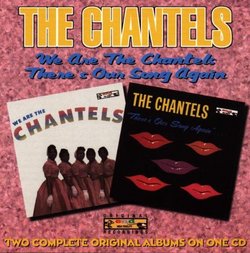The Unforgettable Chantels
Stephanie DePue | Carolina Beach, NC USA | 01/26/2007
(5 out of 5 stars)
"The Chantels were among the first, and greatest of the girl groups, breaking into recording in the late 1950's, behind their great lead singer, Arlene Smith. They were, in fact, so early on the scene that this, their first record, did not show these young black girls on the cover: it shows a couple of white, teenaged bobby-soxers at a jukebox.
Nevertheless, The Chantels had some great hits at that time, " Maybe," "The Plea,""He's Gone," and "I Love You So," for a few. They were able to sing a capella with the best of the boys, and Arlene Smith's floating falsetto (seems us northeastern urbanites loved our falsettos) was a thing of beauty.
The group, also consisting of Lois Harris(1st tenor), Sonia Goring( 2nd tenor), Jackie Landry(2nd alto) and Rene Minus, had been singing together for seven years at their 1957 debut, since their preteen days at St. Anthony of Padua in the Bronx, New York City, where they were in a very active choir: taught to sing a capella, gospel, of course; Gregorian chants (in which they learned to change notes and parts, pronto). Girls back then, even the toughest Bronx girls, couldn't hang out on street corners, as the doo wopp boys did. So they rehearsed in the girls' locker room of St. Anthony's, after the basketball team, including Arlene Smith, finished their games.
Smith, who trained as a classical singer, and sang solo at New York's prestigious Carnegie Hall at the age of twelve, must be counted among the greatest voices, and the greatest musicians ever produced by rock and roll. She could write songs, both music and words, and wrote, as her first song and first hit, "He's Gone." She also wrote "The Plea," and several other songs in the group's repertory: well, of course, she was going to write for her own remarkable voice. Last heard from, she was an elementary school teacher in the Bronx, but she could do anything with that voice: jazz, classical; maybe she just didn't get enough of a chance. In the 1970's, she reconstituted the group with younger women, and did some golden oldies gigs. I was lucky enough to catch one of them, and her voice still floated free. Beyond that, the expressions of sheer joy on those girls' faces, as they hit those notes, was unforgettable.
You really want to try to find this album. I got mine by getting my hands on it seconds before an extremely large, muscular woman, at a Brooklyn street fair quite near a prison, where I've always thought she worked."


 Track Listings (24) - Disc #1
Track Listings (24) - Disc #1